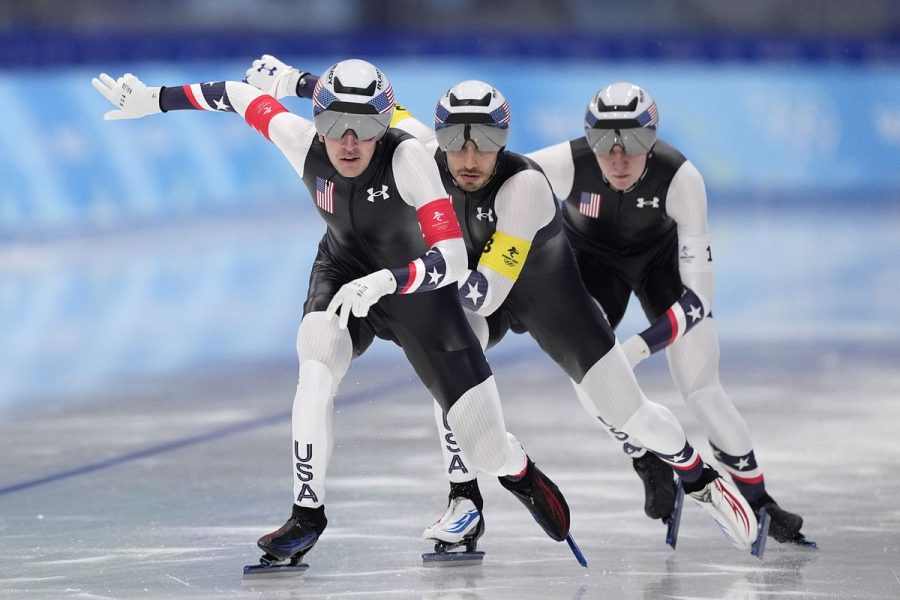OPRF Huskie turned Olympic medalist: Emery Lehman wins bronze in Beijing
Eight years ago, then OPRF senior Emery Lehman competed in the 2014 Winter Olympic Games as the youngest male member of Team USA. Now at 25, the Olympic veteran has cemented his speedskating legacy, winning a bronze Olympic medal this February.
Although he came into the 2022 Olympic trials as a returning member of the US speedskating team, Lehman had to fight to make his third winter games. He finished third in the 5,000 meter and later second in the 1,500 meter to secure his spot in Beijing.
Lehman’s most anticipated race was the team pursuit, a 5,000 meter race completed together by three skaters. At the 2021 ISU Speed Skating World Cup, Lehman, along with teammates Joey Mantia and Casey Dawson, set the world record in the event.
“The world record was really special. It was one of our early season goals to do that and once we got it, it was a slight sigh of relief,” says Lehman.
Along with the world record came high expectations for the Olympic games just two months ahead. “I went into these games with some expectations and had high hopes for a medal. That little added pressure makes them a little more exciting,” he says.
Lehman’s first race in the 2022 Olympics was the 5,000 meter. He matched his best Olympic placement in the event with 16th while skating eight seconds faster. Two days later, he placed 11th in the 1,500.
“I just think I have matured in my technique, my training mindset, and how I look at the sport. I have dedicated a lot more time to training and it has paid off,” he says.
Speedskating teammate Ethan Cepuran notices Lehman’s attention to detail. “He’s extremely calculated, there isn’t a detail he doesn’t think of before going to the line,” Cepuran says.
After the 2018 Olympic games, Lehman made some changes to his training. “I made a coaching change after a year off. In that year off I played club hockey at Marquette University,” he says. “Since then we have really had a tough program. Most summer days consist of two training sessions ranging from two and a half to four hours, typically.”
Lehman has also been continuing his academics while training for speed skating. He studied civil engineering at Marquette University and is now getting a masters degree from Johns Hopkins University in structural engineering.
“I have to work my social life and school around training, but it is nothing I haven’t done in the past 10 years,” he says.
The United States Team Pursuit entered the Olympics as favorites for gold having gained the world record a few months back. However, the team fell short in the quarterfinals, setting them up for the bronze medal round.
“Obviously a gold medal was our goal, but with how things went, I don’t think we could have done anything different to have got the gold besides maybe winning the quarterfinal round. The Russians skated pretty amazing,” he says.
Lehman’s team won the bronze medal round, giving him his first Olympic medal. “Medaling is great. There’s always a lot of pressure from the media back home to medal so it’s nice to fulfill that goal. Obviously it’s a great reward for years and years of sacrifice,” he said.
The members of the team pursuit attribute their success to their focus and communication. “We were real honest with each other,” said Cepuran. “We didn’t overlook a single detail. We communicated after every set and we formed a bond to where we looked forward to skating with each other.”
Although he may be considered an Olympic veteran, Lehman is still only 25, 10 years younger than his team pursuit teammate Mantia. But before he returned to his training, he wanted to soak in his time in Beijing.
“The Olympics are far and few in between, and once they start they go by very quickly. (I would tell my younger self to) meet new people, get out of your comfort zone, and don’t be completely satisfied with your results until you’re on top of that podium,” he said.

